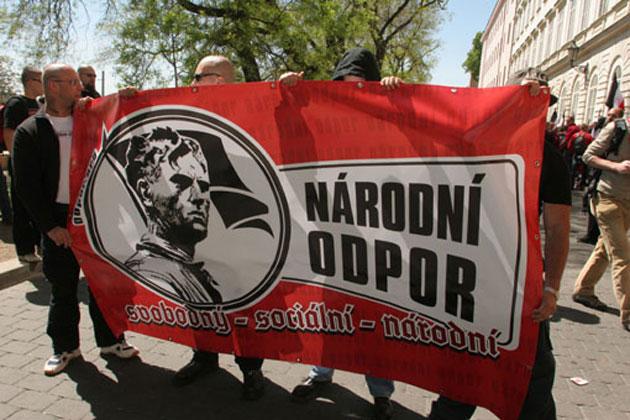Czech Prosecutor General working with OSCE to prosecute hate speech more effectively

News server Aktuálně.cz reports that roughly 100 prosecutors in the Czech Republic are being trained in how to more effectively prosecute hate crime. The decision is based on an agreement concluded between the Office of the Prosecutor General, Pavel Zeman, and the Organization for Security and Cooperation in Europe (OSCE).
The purpose of the memorandum is to more thoroughly prosecute felonies that influence the atmosphere in society per se. The subject of hate speech committed through the Internet is also being covered by a report commissioned by Anna Šabatová in one of her last acts as ombudswoman, which works with data acquired from the courts.
Creating awareness of an “us” and a “them”
The former secretary of the “Freedom and Direct Democracy” (SPD) movement, Jaroslav Staník, received a conditional sentence last spring for his drunken appearance in the Czech lower house. During his remarks made on that occasion he shouted in a vulgar way that homosexuality is a “disease” and that Romani people deserved to be “sent to the gas chamber”.
Police are also investigating racist remarks made by Czech MP Karla Maříková (SPD) about immigrants. Several people are also being prosecuted for expressing agreement with the terrorist attacks in New Zealand or the terrorist deeds of Anders Breivik.
These are some of the most prominent crimes of hate speech committed recently in the Czech Republic. The case of the singer Radoslav Banga, on the other hand, demonstrates that not all such offenses are thoroughly investigated.
For making a gesture of protest against the neo-Nazi band Ortel receiving a popular music award, Banga’s profile on Facebook was attacked with hundreds of hateful posts, including death threats, but just a few people ended up in court for them. “Bias crimes do not just negatively impact their direct victims’ personal experiences and safety. They also create the awareness of an ‘us’ and a ‘them’. They divide society according to discriminatory criteria – ethnic origin, religion, or sexual orientation. That causes harm to those communities and to society as a whole,” Katya Andrusz, a spokesperson for the Office for Democratic Institutions and Human Rights at the OSCE, told the news server
According to an agreement between that office, the Judicial Academy and the Prosecutor General, a memorandum has been signed that is meant to contribute to the Czech Republic fulfilling its obligation to protect human rights. “The Prosecutor General has long been observing an adverse trend whereby, especially as part of discussions on the Internet, posts appear that very often cross the line into criminal behavior. From committing verbal attacks, the road to committing physical violence is not necessarily a long one. This training will aid us with unifying our practice, explaining some concepts in the area of hate speech, and clarifying what to prosecute or how to secure evidence,” the news server quoted Zeman as saying.
Ombudswoman: Hate speech online and on trial
Anna Šabatová, in one of her last acts as ombudswoman, has highlighted the dissemination of hate in the virtual world in a document entitled “Hate Speech on the Internet and the Decision-making of the Czech Courts” (Nenávistné projevy na internetu a rozhodování českých soudů). The introduction includes the following assessment of the situation: “It was 9 November 2017, and news servers were reporting about a wave of hateful commentaries being made through social media that were sparked by an apparently innocent event – the publishing of the class photos of first-graders on the website of a daily in Teplice. That event shook me deeply, as a human being – the reason for the hatred against the children in the photo was the color of their skin, or better said, their ethnic origin. Speech and vocabulary that we would have expected, just a few years ago, to only ever hear from representatives of extremist movements has come into the mainstream of public discussions. It was then that I became aware that Czech society is likely heading in a direction from which it may not necessarily be possible to turn back.”
Further on she writes about the experiences of the judicial system with hate speech cases: “According to communications from the presiding judges, the district courts handed down decisions in a total of 47 cases involving hate speech online between 2016 and June 2019. A minority of the district courts (25 out of 86, or 29 %) has experience with cases involving hate speech online. In most cases, a particular court has only ever handled such a case once.”
The hate speech in online settings that has been prosecuted, according to Šabatová, is frequently associated with a specific affair being reported by the media, but it does not seem that there is any ongoing, systematic monitoring of illegal content on the Internet as a consequence. The most frequent targets of the speech in these cases are Romani people (49 % of the court decisions) and Muslims (23 % of the decisions).
The cases of hate speech online that the Czech courts have ruled on have almost always been perpetrated by a man (94 % of the cases) who is not a member of any minority (94 % of the cases) and who has no criminal record (91 % of the cases). When the case was tried, the perpetrator in most cases was found guilty during the first instance – 43 of the 47 cases (91 %) ended in conviction.
The most frequent punishment (in 27 decisions) was a conditional prison sentence (the prison time was 10 months on average) with the designation of a probationary period (24 months on average), as well as fines (10 decisions with an average of CZK 15 800 – EUR 600) with the designation of an alternative to prison time (lasting an average of two months). The courts also ordered the convicted perpetrators to perform community service or confiscated their property.
Specific examples of hate speech
Šabatová then goes on to describe some concrete examples of these crimes. One involved the publication of photographs of newborns on the Facebook profile of the Zprávy.cz news server.
The perpetrator joined the discussion happening online in response to the photograph of one of the children, whose name evoked an ethnicity or nationality other than Czech. He posted this remark: “It’s garbage, it has it in the genes. It will just keep reproducing on and on, how many offspring will a nigger like that have in 25 years? So for me, stomp it on the neck …”.
According to the court, the perpetrator publicly incited hatred of an ethnic group, committing that crime on a publicly accessible computer network, and he was sentenced to 100 hours of community service. The court also obliged the perpetrator to pay the child’s mother CZK 5 000 [EUR 200] in damages as the injured party.
The most recent full report by the Czech Interior Ministry on extremism for 2018 states that detectives prosecuted 177 people for crimes committed on the basis of hatred of a national, racial or other group. That was 49 more people than in 2017.
A unified overview of the actual incidence of such crimes in the Czech Republic does not, however, exist. The Justice Ministry’s statistics and those of the Prosecutor General are reported according to the time the indictment or prosecution has been filed, while police records reflect the time at which the crime was committed.
